Introduction
In today’s dynamic business landscape, effective contract management is no longer an option, but a necessity. It goes beyond simply having signed documents; it’s about proactively managing the entire contract lifecycle, from creation and negotiation to execution, monitoring, and renewal.
This comprehensive guide explores the importance of contract management, outlines the steps to establishing a robust system, and delves into crucial aspects like contract creation, approval processes, and storage and retrieval.
Importance of Contract Management
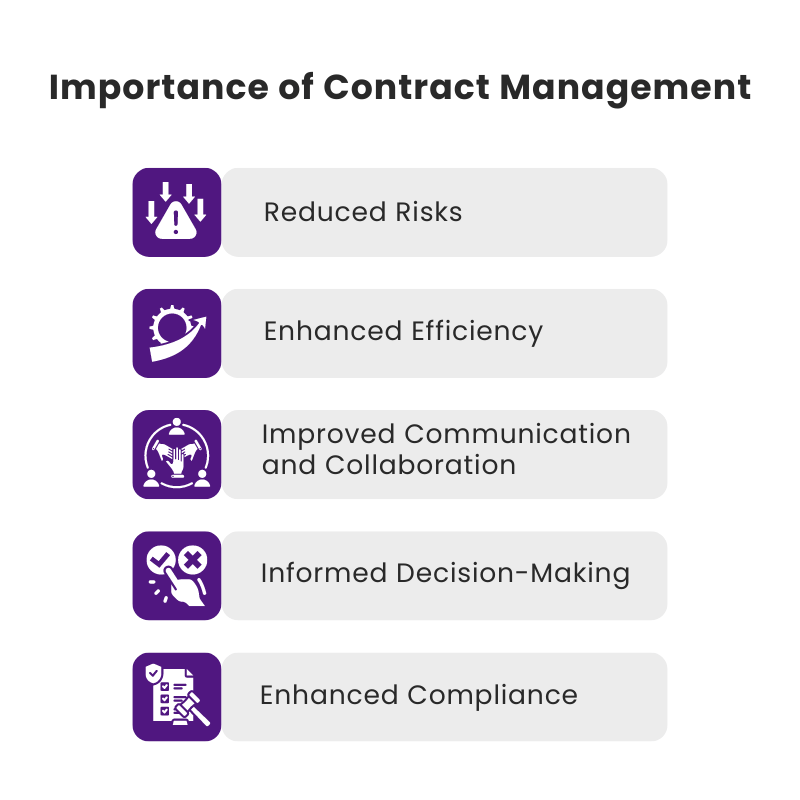
- Reduced Risks: Clear and well-defined contracts minimize the risk of misunderstandings, disputes, and potential legal ramifications. This proactive approach helps businesses avoid costly litigation and protects their financial well-being.
- Enhanced Efficiency: Streamlined processes with the aid of a contract management system save valuable time and resources. Automation of routine tasks like contract creation, approval workflows, and storage frees up human resources for core business activities.
- Improved Communication and Collaboration: Clearly outlined expectations and roles in contracts foster better communication and collaboration with internal and external stakeholders. This promotes smoother project execution and minimizes friction due to misunderstandings.
- Informed Decision-Making: Contract management systems provide valuable data and insights into contract performance, enabling informed decision-making regarding future collaborations and potential risks. This proactive approach allows businesses to identify and address potential issues early on.
- Enhanced Compliance: A robust system helps ensure compliance with relevant regulations and legal requirements, mitigating the risk of penalties and legal non-compliance issues.
Steps to Establishing a Robust Contract Management System
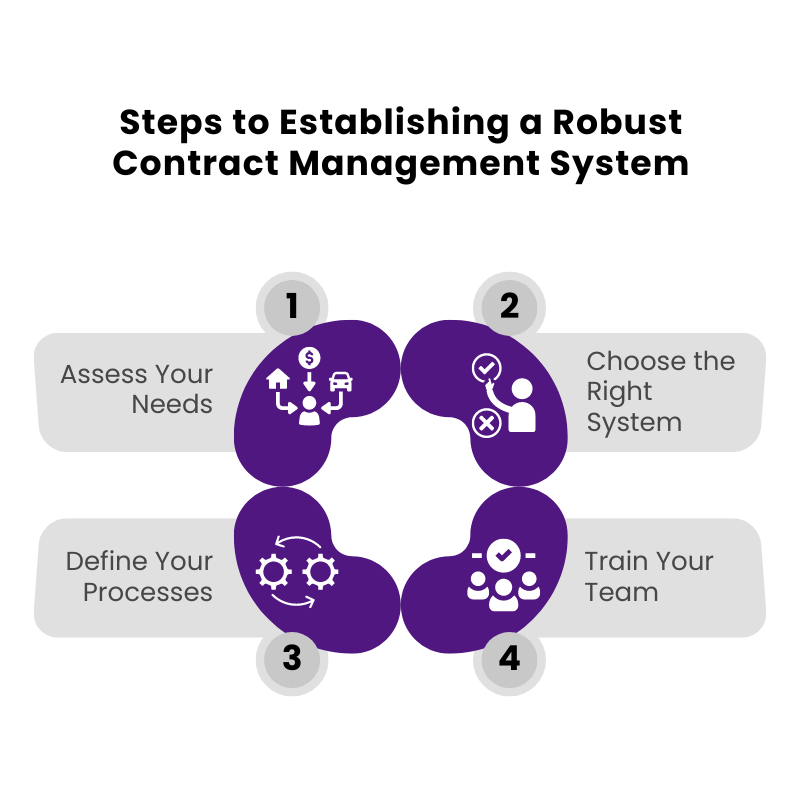
- Assess Your Needs: Identify your specific business needs and goals for contract management. Consider factors like the volume of contracts you handle, the complexity of your contract terms, and the level of automation desired.
- Choose the Right System: Explore various contract management software solutions available, considering features like contract creation templates, workflow automation, storage capabilities, and reporting functionalities. Choose a system that aligns with your budget and technical infrastructure.
- Define Your Processes: Define clear and standardized processes for each stage of the contract lifecycle, including contract creation, negotiation, approval, execution, monitoring, and renewal.
- Train Your Team: Train your team on the new contract management system and the defined processes. Ensure everyone understands their roles and responsibilities in managing contracts effectively.
Contract Creation
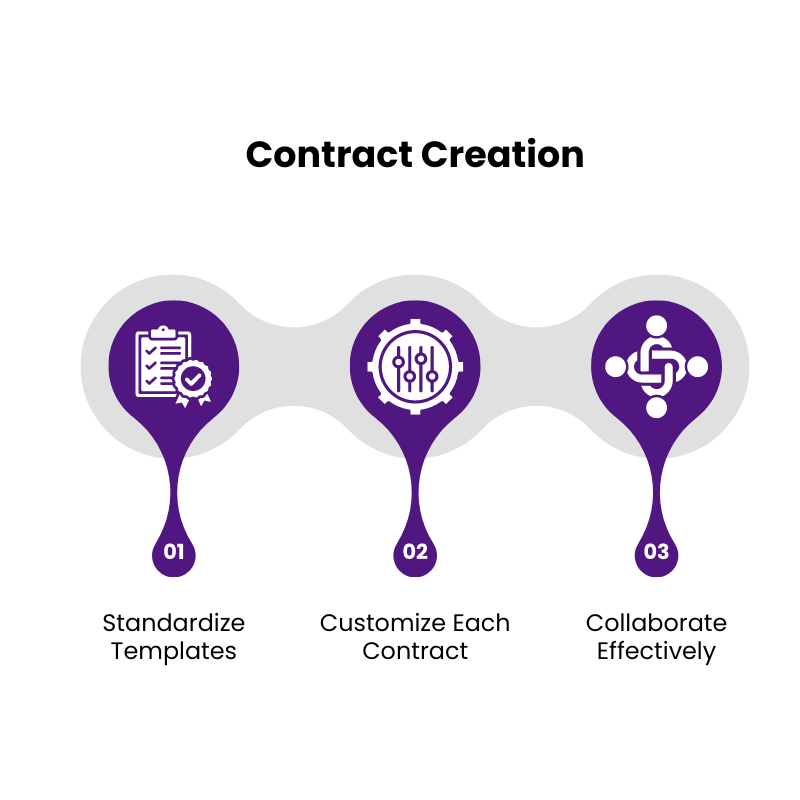
- Standardize Templates: Develop standardized contract templates based on your typical business needs. This saves time and ensures consistency across agreements.
- Customize Each Contract: While using templates is efficient, customize each contract to address the specific details of the engagement, including project scope, deliverables, timelines, and pricing.
- Collaborate Effectively: Facilitate collaboration between different departments involved in the contract creation process, such as legal, sales, and procurement. This ensures all relevant perspectives are considered and incorporated into the final document.
Approval Processes
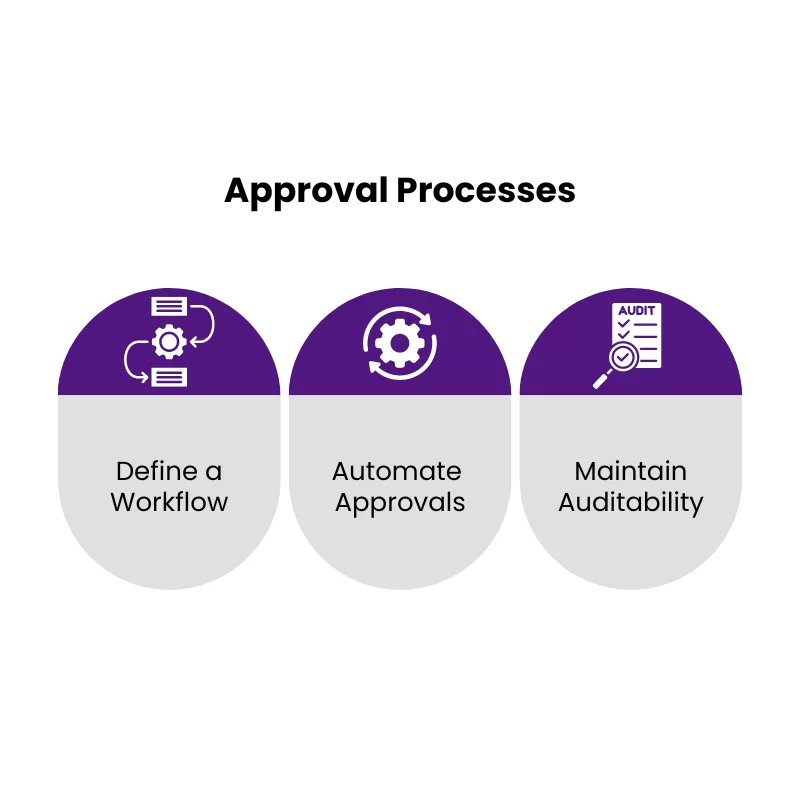
- Define a Workflow: Establish a clear and defined workflow for contract approval, outlining the steps, individuals involved, and turnaround times for each stage.
- Automate Approvals: For standardized contracts with minimal risk, consider automating approvals for specific stages of the workflow, expediting the process.
- Maintain Auditability: Maintain a clear audit trail for each contract, documenting all revisions, approvals, and communication throughout the process.
Storage and Retrieval
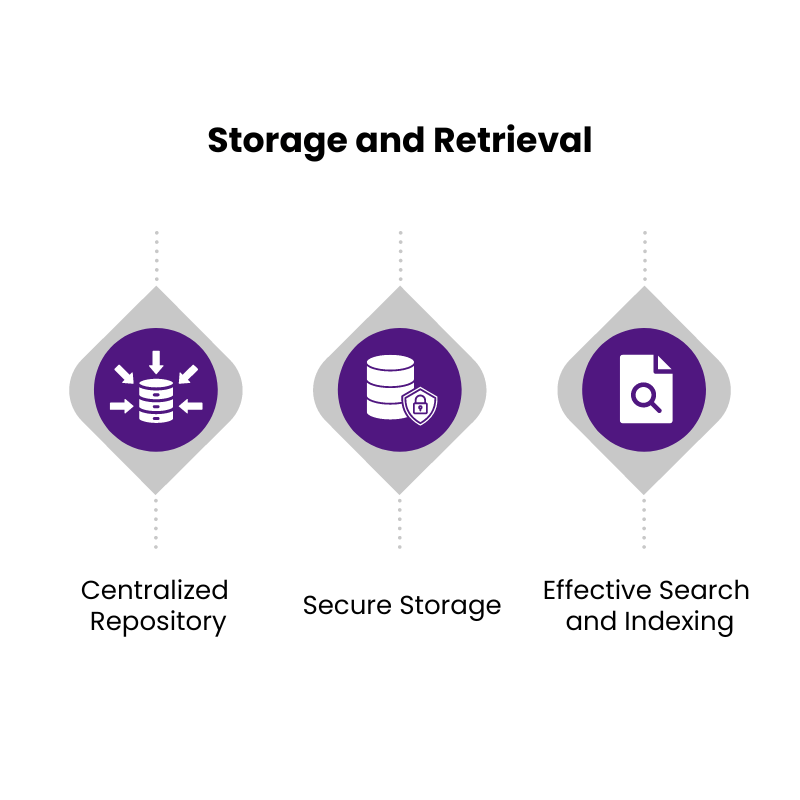
- Centralized Repository: Establish a centralized repository for storing all contracts electronically. This ensures easy access, retrieval, and version control for all authorized users.
- Secure Storage: Implement robust security measures to protect sensitive information within the contracts and ensure compliance with data privacy regulations.
- Effective Search and Indexing: Employ effective search and indexing functionalities within your contract management system to facilitate easy retrieval of specific contracts based on keywords, dates, or other relevant criteria.
By implementing these steps and establishing a robust contract management system, businesses can reap the numerous benefits associated with proactive contract management.
This ensures greater efficiency, reduced risks, improved collaboration, and ultimately, contributes to enhanced business success.
Remember, consistent process adherence and ongoing system evaluation are key to maintaining an effective contract management system.
Tools for Effective Contract Management
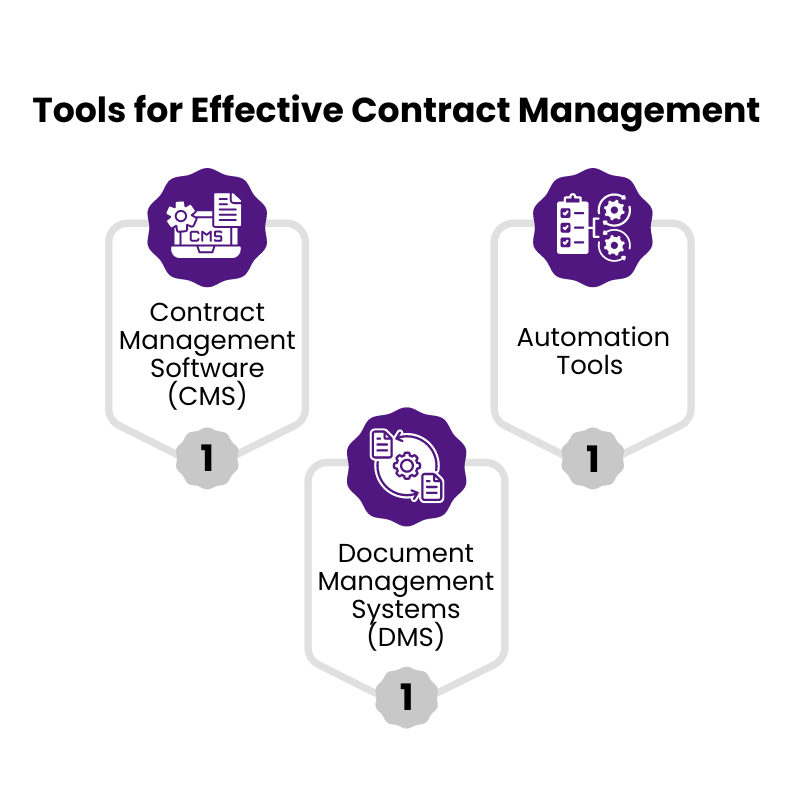
In today’s fast-paced business environment, efficient and effective contract management is crucial for streamlining operations, mitigating risks, and fostering strong partnerships.
Fortunately, a diverse array of powerful tools exists to empower businesses of all sizes to elevate their contract management practices. Let’s delve into three key categories of tools that can significantly enhance your approach:
Contract Management Software (CMS)
- Core Functionality: CMS solutions serve as the central hub for all your contract management needs. They offer a comprehensive suite of features designed to automate tasks, streamline workflows, and centralize contract information.
- Key Features
- Contract Creation: Utilize pre-built templates, collaborate on drafting, and ensure consistency across contracts.
- Negotiation and Approval Workflow Management: Define automated workflows for routing contracts for approval by relevant stakeholders and manage revisions efficiently.
- Electronic Signatures: Facilitate secure and legally binding e-signatures, eliminating the need for paper-based processes.
- Storage and Retrieval: Securely store all contracts electronically, enabling easy access and retrieval based on various criteria.
- Reporting and Analytics: Generate customizable reports to gain insights into contract performance, identify trends, and make informed decisions.
Document Management Systems (DMS)
- Complementary Role: While not specifically designed for contracts, DMS platforms offer valuable capabilities that complement your overall contract management strategy.
- Key Benefits
- Centralized document storage: Securely store and manage all contract-related documents, including emails, attachments, and supplementary files, alongside the actual contract.
- Version control: Track changes made to documents, ensuring you always have access to the most current version.
- Collaboration features: Facilitate collaboration on documents among internal and external stakeholders, streamlining communication and revision processes.
Automation Tools
- Efficiency Boosters: Automation tools can be integrated with your CMS or operate independently to automate repetitive tasks and enhance overall efficiency.
- Examples
- Automatic contract generation: Generate contracts based on pre-defined templates and populate them with relevant data, saving time and effort.
- Reminder notifications: Set automated reminders for upcoming renewal dates, approval deadlines, or key milestones within contracts.
- Data extraction and analytics: Leverage tools to extract key data from contracts and generate reports, streamlining data analysis and decision-making.
Choosing the Right Tools
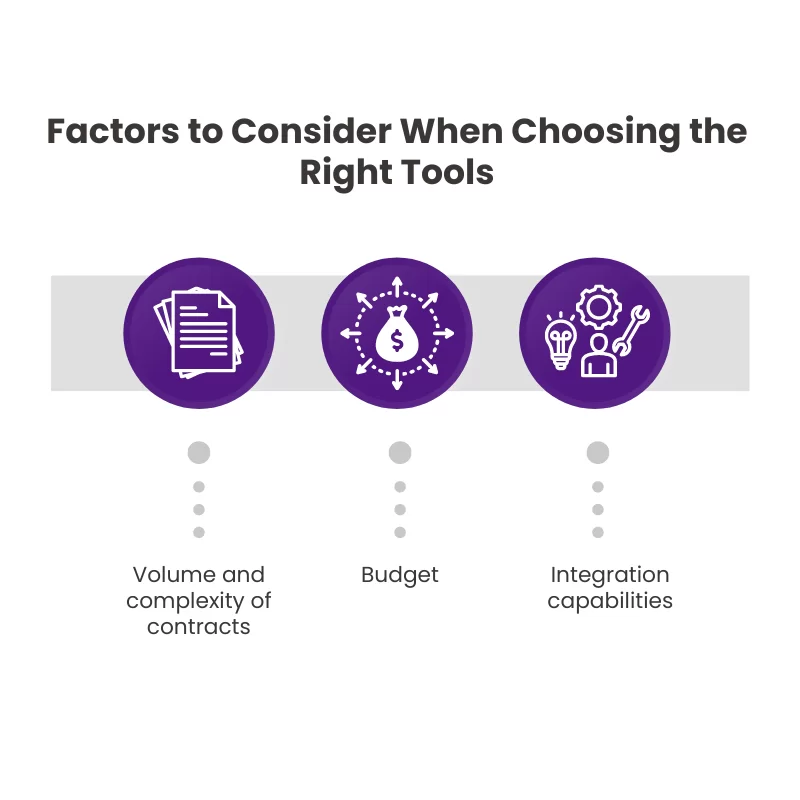
Selecting the most suitable tools depends on your specific needs and business size. Consider factors such as:
- Volume and complexity of contracts: Larger enterprises with high contract volumes may require more robust and feature-rich solutions compared to smaller businesses.
- Budget: Explore a variety of options to find a solution that aligns with your budget constraints.
- Integration capabilities: Ensure selected tools integrate seamlessly with your existing software ecosystem to avoid data silos and maintain a centralized flow of information.
By leveraging the power of contract management software, document management systems, and automation tools, businesses can embark on a journey towards enhanced contract management efficiency, heightened risk mitigation, and ultimately, a thriving business environment.
Remember, continuously evaluating and optimizing your chosen tools is crucial to ensure they continue to meet your evolving needs and contribute to your long-term success.
Ensuring Compliance in Contract Management
In today’s complex business landscape, navigating the intricate world of contract management requires not only efficiency and organization but also a steadfast commitment to compliance.
This entails adhering to both external regulations and internal company policies to minimize risks, maintain ethical practices, and protect your business from legal ramifications.
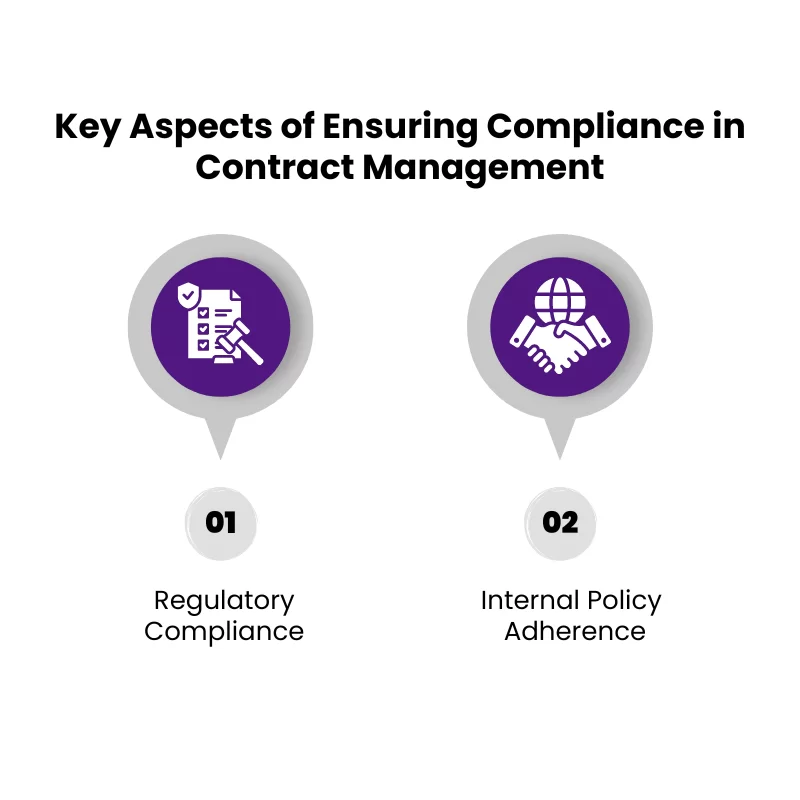
Here, we explore the two key aspects of ensuring compliance in contract management:
Regulatory Compliance
- Understanding the Landscape: Familiarize yourself with all relevant regulations that may apply to your contracts, including those pertaining to data privacy, consumer protection, industry-specific regulations, and contractual terms. This requires continuous research and staying updated on any changes to the legal landscape.
- Incorporating Compliance Clauses: Integrate compliance clauses into your contracts that address specific regulatory requirements. These clauses should outline how you will handle data security, consumer rights, and other relevant aspects in accordance with the applicable regulations.
- Risk Assessment and Mitigation: Conduct regular risk assessments to identify potential areas of non-compliance within your contracts. Once identified, develop, and implement mitigation strategies to address the risks and ensure adherence to regulations.
Internal Policy Adherence
- Policy Awareness: Ensure all personnel involved in the contract management process, from drafting to execution, are well-versed in your company’s internal policies and procedures. This includes policies on conflict of interest, confidentiality, ethical conduct, and contract negotiation guidelines.
- Standardized Processes: Implement standardized processes for contract creation, approval, and execution. These processes should be clearly documented and accessible to all relevant stakeholders to ensure consistency and adherence to internal policies.
- Monitoring and Auditing: Regularly monitor and audit your contract management practices to identify any instances of non-compliance with internal policies. This proactive approach allows you to address any issues promptly and prevent them from recurring.
Additional Tips for Ensuring Compliance
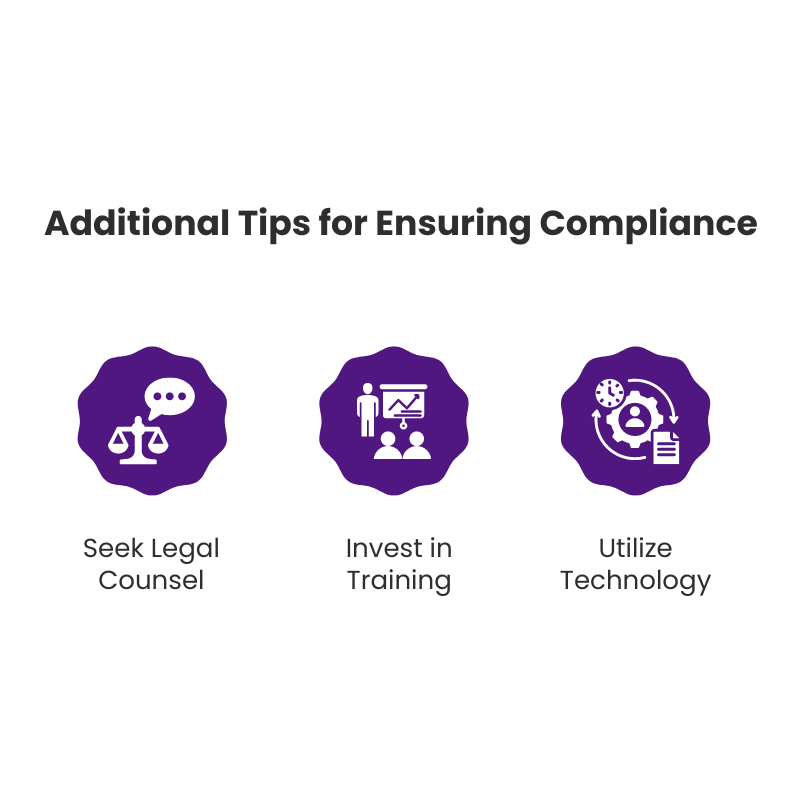
- Seek Legal Counsel: Consult with a qualified legal professionalwhen dealing with complex contracts or unfamiliar regulatory landscapes. Their expertise can help you navigate legal intricacies and ensure your contracts adhere to all applicable regulations.
- Invest in Training: Provide regular training for your staff involved in contract management on relevant regulations and internal policies. This continuous learning ensures everyone stays updated on compliance requirements and best practices.
- Utilize Technology: Leverage contract management software with built-in compliance features. These features can help track key dates, automate reminders for renewals, and flag potential compliance issues.
By prioritizing and implementing effective strategies for ensuring compliance in both regulatory and internal policy aspects, businesses can foster a culture of ethical conduct, mitigate legal and financial risks, and ultimately, build trust with stakeholders through responsible and compliant contract management practices.
Remember, continuous vigilance and proactive measures are key to navigating the ever-evolving landscape of compliance and safeguarding your business from potential pitfalls.
Case Studies: Lessons Learned from Contract Disputes
Case Study 1: Unclear Scope Leads to Legal Battle – Software Development Project
Challenge: A software development company, CodeX, entered into a contract with a client to develop a custom software application. However, the contract lacked a clear and detailed scope of work, leading to misunderstandings about the functionalities and deliverables expected.
Outcome: Disputes arose between CodeX and the client regarding additional features and timelines, ultimately culminating in a costly legal battle. Both parties incurred significant financial losses and reputational damage.
Take aways
- Clearly define the scope of work in the contract, including specific functionalities, deliverables, and timelines.
- Avoid ambiguity in contract language, ensuring all terms are clearly understood by both parties.
- Seek legal counsel when drafting and negotiating complex contracts, particularly for projects with a high degree of customization.
Case Study 2: Lack of Change Management Procedures – Marketing Campaign
Challenge: A marketing agency, AdSpark, signed a contract with a client to run a social media marketing campaign. However, the contract did not outline a clear process for handling changes or revisions to the campaign strategy.
Outcome: As the campaign progressed, the client requested several changes to the target audience and content strategy. The lack of a formal change management process led to confusion, delays, and additional costs for both AdSpark and the client.
Take aways
- Establish a clear and defined change management process within the contract, outlining the steps for requesting, reviewing, and approving changes to the agreed-upon scope of work .
- Document all changes and obtain written confirmation from both parties to avoid future disputes.
- Maintain clear communication throughout the project and address any concerns or requests for changes promptly and professionally.
These case studies highlight the importance of careful contract management and the potential pitfalls associated with poorly constructed agreements. By learning from these examples, businesses can develop and implement effective practices.
Future Trends in Contract Management
Contract management is undergoing a transformation, driven by technological advancements and a dynamic legal landscape.
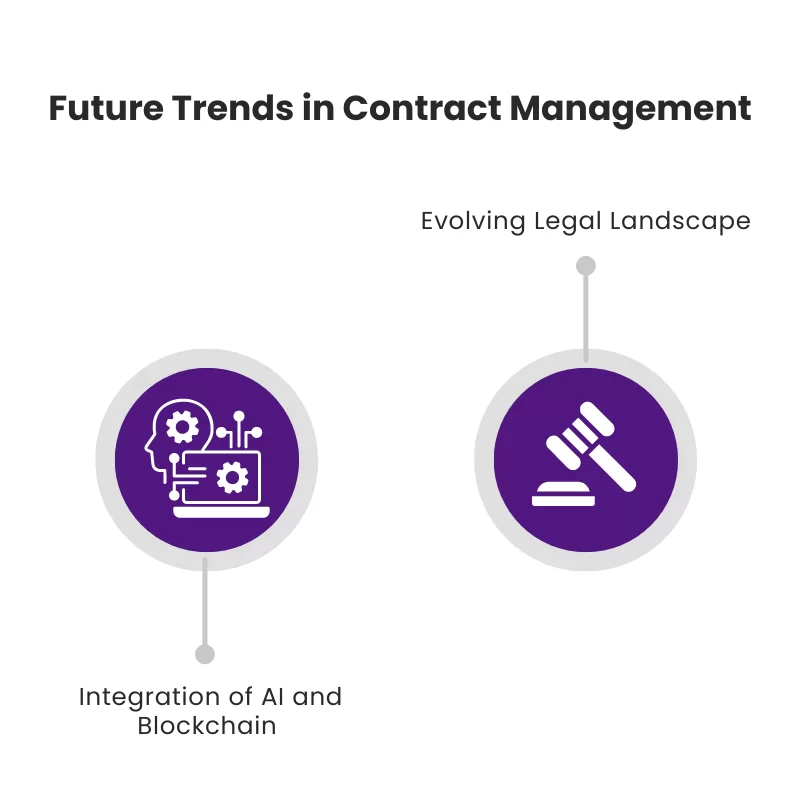
Businesses that embrace innovation and adapt to these trends will be well-positioned to enhance efficiency, mitigate risks, and cultivate stronger relationships with their partners.
Here, we explore two key trends that will shape the future of contract management:
Integration of AI and Blockchain
- Artificial Intelligence (AI)
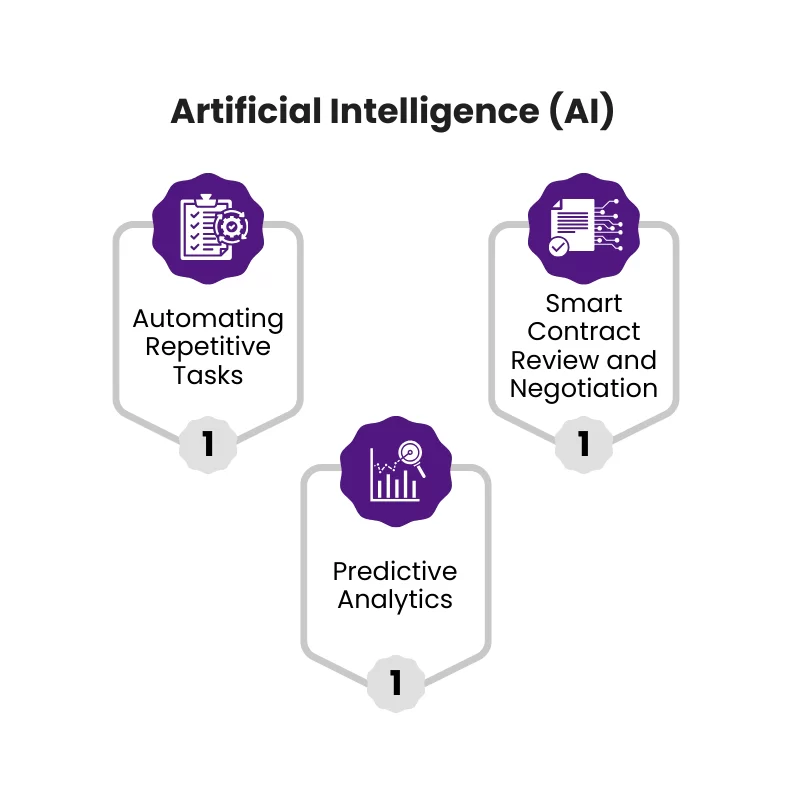
- Automating Repetitive Tasks: AI-powered tools can automate routine tasks like contract creation, data extraction, and risk assessment, freeing up human resources for strategic analysis and decision-making.
- Smart Contract Review and Negotiation: AI can assist with reviewing contracts, identifying potential risks and inconsistencies, and even suggesting revisions, expediting the negotiation process.
- Predictive Analytics: AI can analyze historical data to predict potential contract performance issues and suggest proactive measures to mitigate them.
- Blockchain Technology

- Enhanced Security and Immutability: Blockchain technology can create secure and tamper-proof records of contracts, minimizing the risk of fraud and manipulation.
- Improved Transparency and Traceability: All contract amendments and interactions are recorded on the blockchain, providing a transparent and auditable history for all parties involved.
- Streamlined Collaboration: Blockchain platforms can facilitate seamless collaboration between different parties involved in the contract lifecycle, ensuring efficient communication and document exchange.
- Evolving Legal Landscape

- Focus on Data Privacy: With increasing emphasis on data privacy regulations like GDPR (General Data Protection Regulation) and CCPA (California Consumer Privacy Act), contract management will need to adapt to include specific clauses addressing data security, ownership, and usage rights.
- Standardization and Best Practices: Regulatory bodies and industry associations may develop standardized contract templates and best practices for specific sectors, promoting greater transparency and consistency within industries.
- Emerging Technologies and Regulations: As new technologies like Artificial Intelligence and the Internet of Things (IoT) continue to evolve, new legal and regulatory frameworks will likely emerge, requiring ongoing adaptation and adjustments within contract management practices.
Adapting to these future trends requires a proactive approach. Businesses should consider:
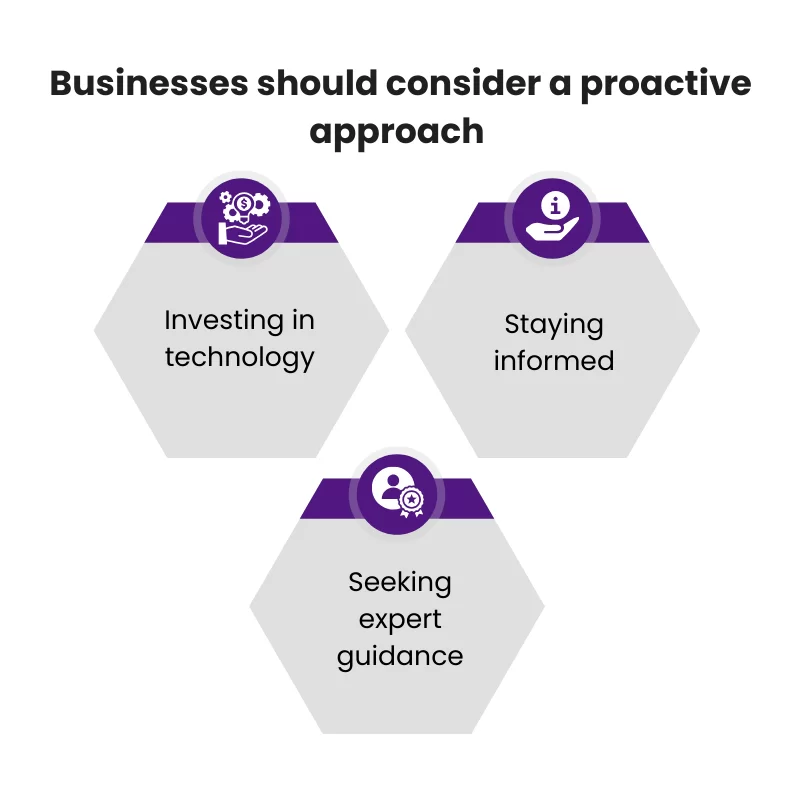
- Investing in technology: Explore and implement AI and blockchain-based solutions to automate tasks, enhance security, and improve collaboration.
- Staying informed: Regularly monitor changes in the legal landscape and adapt contract templates and processes accordingly.
- Seeking expert guidance: Consult with legal professionals and industry experts to ensure your contract management practices are compliant with evolving regulations and leverage the latest best practices.
By embracing these trends and prioritizing continuous improvement, businesses can ensure their contract management practices remain efficient, secure, and adaptable in the ever-evolving legal and technological landscape.
Conclusion
Contract management is no longer just about managing documents; it’s about harnessing the power of technology and adapting to a dynamic legal landscape.
By understanding and implementing the best practices outlined in this guide, businesses can unlock the full potential of effective contract management.
Key Points Recap
- Implementing a Robust System: Establish a system that streamlines contract creation, approval processes, storage, and retrieval. Utilize contract management software, document management systems, and automation tools to enhance efficiency and mitigate risks.
- Ensuring Compliance: Adhere to both external regulations and internal policies. Understand relevant regulations, incorporate compliance clauses in contracts, and regularly monitor and audit your practices. Additionally, emphasize internal policy awareness and implement standardized processes.
- Learning from the Past, Embracing the Future: Understand the potential pitfalls associated with poorly constructed agreements, as highlighted in the case studies. Leverage emerging technologies like AI and blockchain to automate tasks, enhance security, and improve communication. Stay informed about the evolving legal landscape and adapt your practices accordingly.
Encouragement for Effective Practices
Effective contract management is not just a box-ticking exercise; it’s a strategic investment that safeguards your business interests, fosters strong relationships with partners, and empowers informed decision-making.
By embracing the power of technology, prioritizing compliance, and continuously adapting to the changing landscape, you can ensure your business is well-equipped to navigate the future of contract management with confidence and efficiency.




